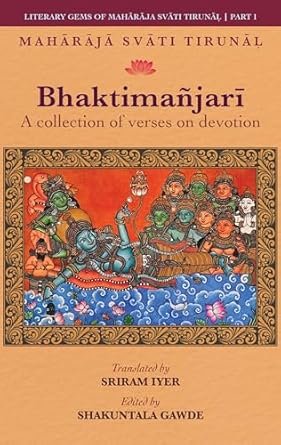Bhakti-Mañjarī is a unique poem composed by Mahārājā Svāti Tirunāḷ (1813- 1846) with bhakti as its central theme. With the Śrīmad-Bhāgavata Purāṇa as its basis, Bhakti-Mañjarī expounds the philosophy of bhakti through its one thousand poetic verses divided over ten śatakas set to various metres. The supremacy of bhakti over all spiritual paths, the various classes of devotees, the selfless and spontaneous compassion of the Lord, the futility of human birth devoid of bhakti, etc. are some of the topics discussed in the work. A major portion of the work is dedicated to an elaborate delineation of the nine forms of devotion viz. śravaṇa, kīrtana, smaraṇa, pāda-sevana, arcana, vandana, dāsya, sakhya and ātma-nivedana. Episodes from the Śrīmad-Bhāgavata Purāṇa such as the life of Prahlāda, the redemption of Gajendra, the redemption of Ajāmila, the self-surrender of Bali, etc, are briefly represented in the course of describing the various forms of devotion. The creation of the universe, its geographical divisions, duties of the four classes and stages of life, the procedure of reciting the Śrīmad-Bhāgavata Purāṇa, the rules of japa, consecration of sacred images, the greatness of Gaṅgā and Tulasī are some of the other highlights of this great work. The brief representation of the pristine philosophy of bhakti through verses embellished with figures of sound and sense makes the work a cherished treasure of scholars and devotees, alike. :::About the Author::: Mahārājā Svāti Tirunāḷ Śrī Rāma Varmā III (1813-1846) the illustrious ruler of Travancore was a poet, a musician and a great patron of arts & literature. His literary compositions include Syānandūrapura-varṇana-prabandha, Padmanābha-Śataka and Bhakti-mañjarī, his magnum-opus. His musical works include 300-odd songs of different genres in various languages and two operatic poems in Sanskrit viz. Kucelopākhyāna and Ajāmilopākhyāna.



